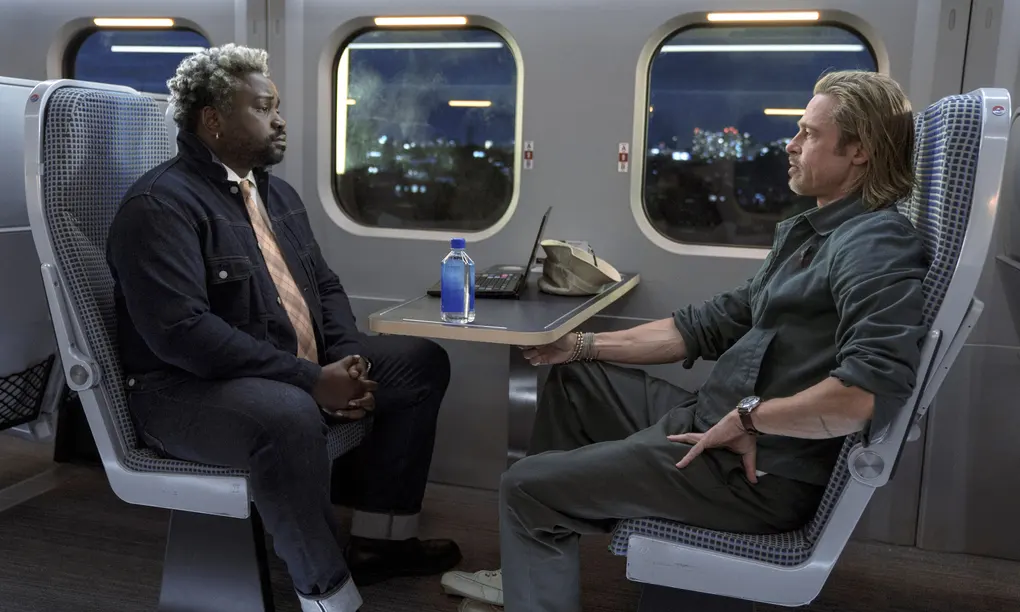By Yasiri J. Kasango
There are plenty of big, dumb action movies out there that can deliver thrills without taxing the mind. And then there are films that are so outrageously stupid that they transcend guilty pleasure and become a danger to themselves and those around them. Bullet Train is in the latter category. It’s so stupid that you wouldn’t trust it to cross the street alone, let alone navigate Japan’s Shinkansen high-speed rail network.
The basic idea, which was taken from Kōtarō Isaka’s 2010 novel, is as follows: Ladybug is a fictional character played by Brad Pitt who is employed by unidentified clients to carry out a number of shady missions. These may entail assassinations, but since he is returning to the shadowy world of the mercenary after some time spent in reflection and therapy, his first job should be simple. All he needs to do is rob a silver briefcase from a bullet train traveling to Kyoto. However, Ladybug has terrible luck and is cursed. And it transpires that the entire train is crowded with hired killers who are lavishly equipped with guns, swords, grudges, and a variety of toxins and who all appear intent on stabbing each other in the face.
A prominent British couple with a close bond, Tangerine (Aaron Taylor-Johnson) and Lemon (Brian Tyree Henry), are among the cast. Taylor-Johnson is a sharp-suited old man who appears to have been plucked from Matthew Vaughn’s offensive Kings-man series, like so many other characters in this brash, hollow movie. Henry, meanwhile, is stuck playing the annoying idiot-savant.
Lemon believes that the Thomas the Tank Engine children’s book series can be used as a guide to interpreting a person’s fundamental characteristics. I’m not kidding. Lemon is obsessed with the series. So, while a Diesel is dishonest and shady, Henry is generally decent. The cast of Bullet Train leans toward the Diesel end of the spectrum, as is to be expected.
Pitt portrays his part as an endearing golden retriever who has ingested a self-help book. A schoolgirl by the name of Prince (Joey King) who claims to be an innocent bystander is also on board. But as previous action films with a Japanese setting, most notably Kill Bill: Volume 1 by Quentin Tarantino, have shown us, schoolgirls are rarely to be trusted. She is the only notable female character in the movie; it says something when a disposable plastic water bottle is given more context than the other female characters.
Despite how egregiously dimwitted it is, it’s not just the clumsy plotting that puts this picture in the dunce’s corner. Action scenes in other, equally mediocre films save them. And Atomic Blonde’s director David Leitch is well-versed in fight scenes. He is the man behind many high-octane stabbing marathons. But there’s also a problem with the movie’s gimmick, which is the train setting. Look no further than the bus scenes in Shang-Chi and the Legend of the Ten Rings and Nobody for examples of creative close-quarters combat on public transportation that is truly beautiful. No matter how many samurai there are, however, if all the combat maneuvers are performed within the confines of a train carriage, they quickly become monotonous.
However, there is still another problem: the tone. Infuriatingly proud of itself, Bullet Train. Pitt is the starting point for this collapse of self-satisfaction. Some people contend that Pitt is the movie’s savior. He’s unquestionably one of the more endearing characters. He portrays his character as a friendly golden retriever that has consumed a self-help book, occasionally coughing up a partially chewed personal development advice. But he is also partly to blame for this mess. The Pitt celebrity is the cargo that gave the project its initial impetus; it is likely because of his involvement that no one demanded a rewrite or, at the very least, a tighter edit to slam on the emergency brakes and avert the inevitable disaster.


